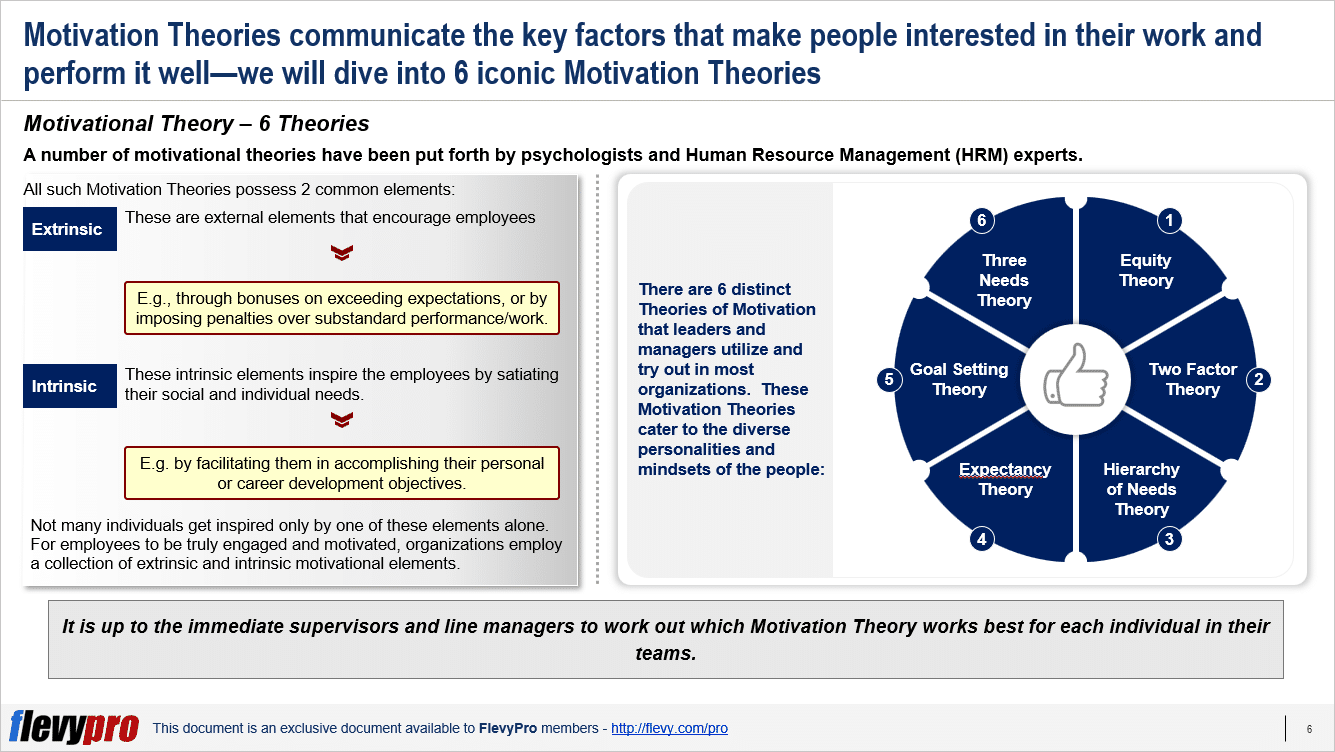Editor's Note: Take a look at our featured best practice, Leadership & Motivation Theories & Models (237-slide PowerPoint presentation). This presentation is a compilation of PowerPoint descriptions and diagrams used to convey 30+ different leadership and motivation theories and models.
These materials can be used for:
1. Self-development - understanding and improving personal leadership knowledge and capability;
2. Teaching [read more]
* * * *

Satisfied, engaged, and encouraged employees are absolutely crucial for the success and growth of an organization. However, interpreting the human psyche and determining what encourages and drives people to achieve their objectives isn’t easy to figure out for leaders and human resources experts. This is where research and insights gathered from the various Theories of Motivation come to play.
The importance of understanding the Theories of Motivation further amplifies as research suggests that only a fraction of employees feel engaged in their respective organizations. Engaged and satisfied employees have been found to be much more efficient and perform better than those who are not.
As each individual is unique, there is no single method to encourage people. Motivational Theories are evaluation tools to help managers comprehend what drives a particular employee. Managers who invest time in getting to know their people, understanding their personalities, and determining their behaviors are more likely to build great teams and environments, achieve objectives and contribute significantly to the organization.
A number of motivational theories have been put forth by psychologists and Human Resource Management (HRM) experts. Out of these, 6 theories are of particular importance and acceptance across industries and organizations:
- Equity Theory
- Two Factor Theory
- Hierarchy of Needs Theory
- Three Needs Theory
- Goal Setting Theory
- Expectancy Theory

It is up to the immediate supervisors and line managers to work out which Motivation Theory works best for each individual in their teams. Let’s delve deeper into some of these theories.
Equity Theory
Equity Theory, postulated by John Adams, underscores that people are greatly influenced by the views and situations of their colleagues in developing a sense of fairness in their workplaces. Their responses, actions, and behaviors are altered in accordance with the way they perceive they are being treated at the organization compared to others. They tend to be more motivated when they feel they are being treated fairly. Likewise they feel demotivated when they feel discriminated against or if they realize that others are enjoying a greater reward-to-effort ratio than they are.
As per the theory, managers have a big role in motivating their people by ensuring treatment of the entire workforce impartially and tackling concerns about inequality instantly.
Two Factor Theory
Frederick Herzberg came up with the Two Factor Theory based on multiple studies to identify key factors that render people motivated or dissatisfied with their jobs. Herzberg studied 14 different factors for their influence on employees’ job satisfaction or dissatisfaction. He categorized these factors into 2 major classes: Hygiene factors (or dissatisfiers) and Motivation factors (or satisfiers).
Hygiene factors (dissatisfiers) are extrinsic to the job and tend to reduce job dissatisfaction by working on the need to avoid conflict or trouble. For example, salary, policies and rules, administration, relationships with bosses and peers, working conditions, workspace, and the quality of a supervisor.
Motivation Factors (satisfiers), on the other hand, are intrinsic and imperative for job satisfaction and satisfy individuals’ growth and self-actualization needs. For example, work, responsibility, performance, and achievement; advancement opportunities; recognition; personal growth; and job status.
The theory suggests that managers who want to motivate their teams should treat employee satisfaction and demotivation as two separate things and use job rotations and reorganization to improve job satisfaction.
Hierarchy of Needs Theory
Maslow’s Hierarchy of Needs Theory stipulates that by satisfying the 5 levels of human needs, people can be motivated. Depicted as hierarchical tiers within a pyramid from bottom to top, these 5 levels are physiological (food, shelter, clothing), safety (employment, health), social (friendship), esteem (recognition, freedom), and self-actualization (personal growth). The 4 lower tiers are described as “Deficiency Needs,” whereas the top tier is referred to as “Growth or Being Needs.”
Interested in learning more about the other theories of Motivation? You can download an editable PowerPoint presentation on 6 Theories of Motivation here on the Flevy documents marketplace.
Do You Find Value in This Framework?
You can download in-depth presentations on this and hundreds of similar business frameworks from the FlevyPro Library. FlevyPro is trusted and utilized by 1000s of management consultants and corporate executives.
For even more best practices available on Flevy, have a look at our top 100 lists:

76-slide PowerPoint presentation
This presentation is a compilation of PowerPoint descriptions and diagrams used to convey eight of the most popular motivation theories and models.
Motivational strategies can help improve employee performance, reduce the chances of low employee morale, encourage teamwork and instill a positive
[read more]
Readers of This Article Are Interested in These Resources

35-slide PowerPoint presentation
Purpose drives people. It is what makes them feel motivated and empowered. People with a sense of purpose find a reason for being. A well-defined purpose enhances satisfaction and self-esteem in individuals. Purpose makes people more productive and better performers.
This PowerPoint
[read more]

37-slide PowerPoint presentation
Interpreting the human psyche is a difficult undertaking. Determining what encourages and drives people to achieve their objectives isn't easy to figure out for Leaders and Human Capital experts. This is where research and insights gathered from the various Theories of Motivation comes to play.
[read more]

51-slide PowerPoint presentation
It's no secret that employees who feel they are valued and recognized for the work they do are more motivated, responsible, and productive. This power point presentation will help supervisors and managers deliver training that will result in a more dynamic, loyal, and energized workplace. It is
[read more]

38-slide PowerPoint presentation
The Business Motivation Model (BMM) is a comprehensive framework designed to capture and convey the intentions behind business strategies and actions. Developed by the Object Management Group (OMG), BMM provides a structured approach for organizations to articulate their goals, objectives,
[read more]






